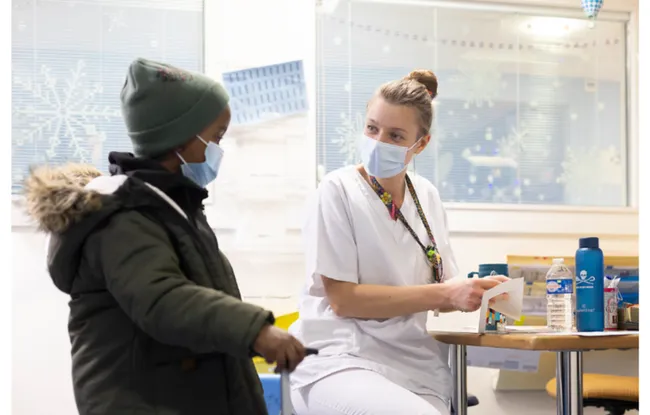- Home >
- Patients and Care >
- Cancer types >
- Soft tissue sarcomas >
- Treatment of soft tissue sarcomas
Soft tissue sarcomas

Treatment of soft tissue sarcomas
Because soft tissue sarcomas vary in nature—some are benign, others very aggressive—treatment strategies also vary. Unlike in adults, surgery is not usually the first step in children.
For the most common type, rhabdomyosarcoma, treatment begins—after assessing disease spread with imaging—with chemotherapy to shrink the tumor. This approach aims to make surgery as conservative as possible and avoid radiotherapy, particularly in young children.
Children with soft tissue sarcomas should be treated at specialized young patient oncology centers, like SIREDO at Institut Curie.
Institut Curie is a member of the European Paediatric Soft Tissue Sarcoma Study Group (EpSSG), which works to develop therapeutic strategies across Europe. Several SIREDO practitioners are active members, helping to tailor treatments to each case using international protocols.
Institut Curie also includes adult sarcoma specialists who work alongside pediatric oncologists to treat “borderline” sarcomas that occur in both adolescents and adults, ensuring treatment is appropriately adapted. These specialists provide their expertise to recommend appropriate treatments for adolescents and young adults suffering from these pathologies.
Find out more about the center SIREDO
Chemotherapy for soft tissue sarcomas
In rhabdomyosarcoma, initial chemotherapy typically includes ifosfamide, vincristine, and actinomycin D. The treatment lasts 9 to 12 months and is primarily administered at Institut Curie, which has a comprehensive technical platform. Some sessions are coordinated with local hospitals through the Ile-de-France Pediatric Oncology Network (RIFHOP).
Since June 2023, newly diagnosed rhabdomyosarcoma patients may be included in the international FaR-RMS study, open until October 2029, to:
- Assess the impact of new chemotherapy agents on aggressive forms,
- Determine if modifying the duration of maintenance chemotherapy improves outcomes,
- Evaluate if changes in radiation dose or timing improve outcomes and quality of life.
For other sarcomas, treatments differ depending on the tumor’s sensitivity to chemotherapy. Molecular analyses at Institut Curie help not only confirm the diagnosis but also predict drug response. Highly chemo-sensitive sarcomas are treated similarly to rhabdomyosarcomas, while low-sensitivity types may be treated mainly with surgery and radiotherapy. Intermediate cases like synovial sarcoma, fibrosarcoma, and rhabdoid tumors are assessed individually to determine the best therapeutic strategy.
Surgery for soft tissue sarcomas
Institut Curie works closely with pediatric hospitals in Paris (Necker, Robert-Debré, Trousseau, and Bicêtre) for surgical treatment. Surgeries are planned in these hospitals, with frequent coordination to prepare each young patient's surgical pathway.
Radiotherapy for soft tissue sarcomas
Radiotherapy is often effective for soft tissue sarcomas and is frequently used. However, due to potential long-term risks, its use is limited in very young children.
Institut Curie offers modern external radiation therapy options including IMRT (Intensity-Modulated Radiation Therapy), tomotherapy, and proton therapy, which allow for precise, targeted treatment even in young children.
Institut Curie houses a Proton Therapy Center in Orsay. This radiotherapy technique is used in cases like neonatal sarcomas or tumors near sensitive organs. Institut Curie’s radiation oncologists and anesthesiologists are experienced in administering proton therapy under general anesthesia for young children.
Find out more about the Proton Therapy Center in Orsay - Institut Curie
Targeted therapies to fight soft tissue sarcomas
Targeted therapies aim to block the function of specific genes or chromosome regions. These treatments interrupt tumor cell processes by addressing specific molecular abnormalities found during biopsy analysis.
Recent advances in molecular biology have improved understanding of various sarcomas. For example, TRK (tyrosine receptor kinase) fusion sarcomas present a molecular anomaly with the particularity of activating receptors. The development of receptor inhibitors, such as larotrectinib and entrectinib, has enabled the treatment of sarcomas in young patients with remarkable results, as demonstrated by Institut Curie. This drug targets tumors with the NTRK (neurotrophic tyrosine receptor kinase) genetic abnormality, primarily found in the cells of infantile fibrosarcoma—a sarcoma that affects infants under 3 months of age—but it may also be present in other tumors. Other targeted drugs include ALK inhibitors (for inflammatory myofibroblastic tumors) and PDGF-β inhibitors (for GISTs and dermatofibrosarcoma). Institut Curie’s pediatric clinical research unit is actively developing new therapeutic strategies.
Oncologists and immunologists at Institut Curie also explore whether certain cellular or genetic traits make tumors suitable for immunotherapy.
Oncogenetics of soft tissue sarcomas
About 15–20% of sarcomas are linked to specific genetic backgrounds. Institut Curie offers families genetic counseling at the time of diagnosis. These discussions are informed by molecular analyses conducted under national tumor-genotyping programs such as FMG 2025 and Mappyact.

